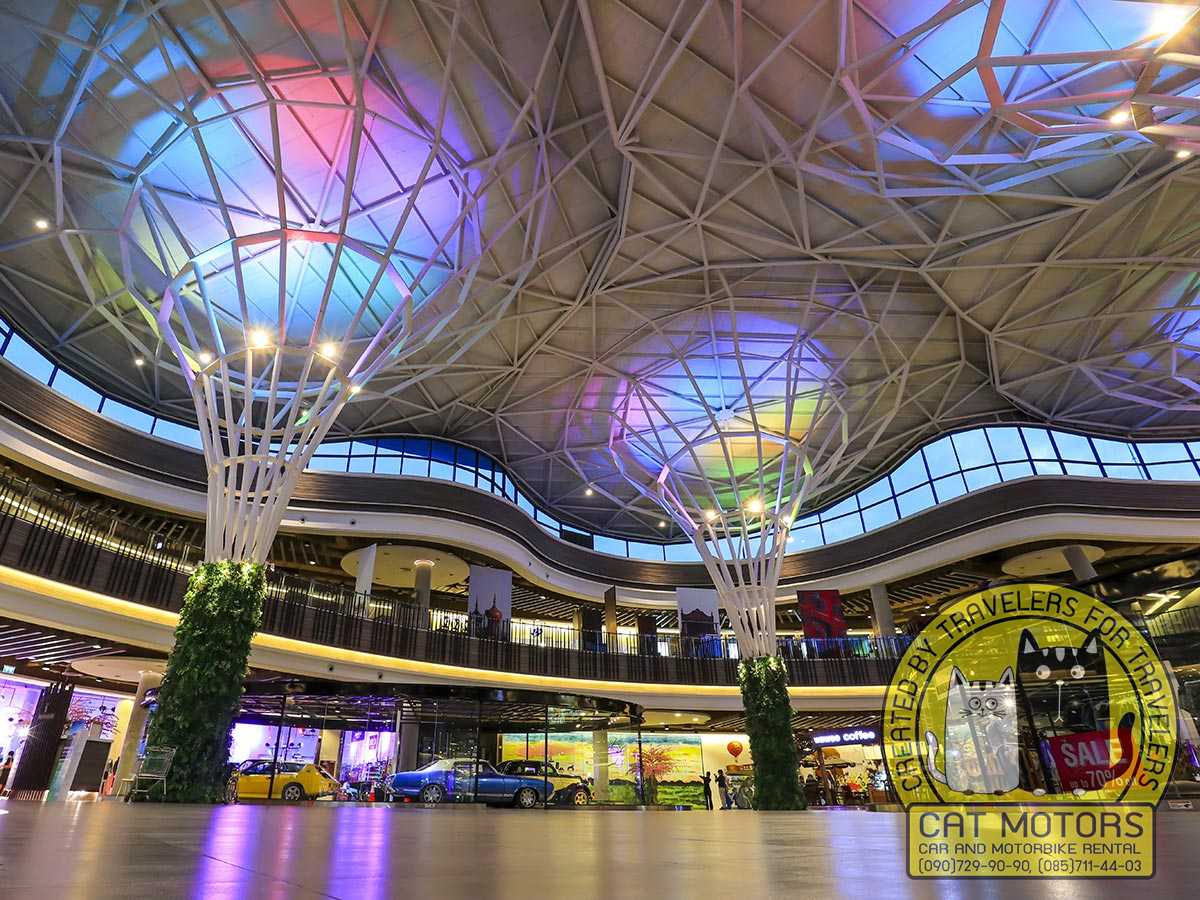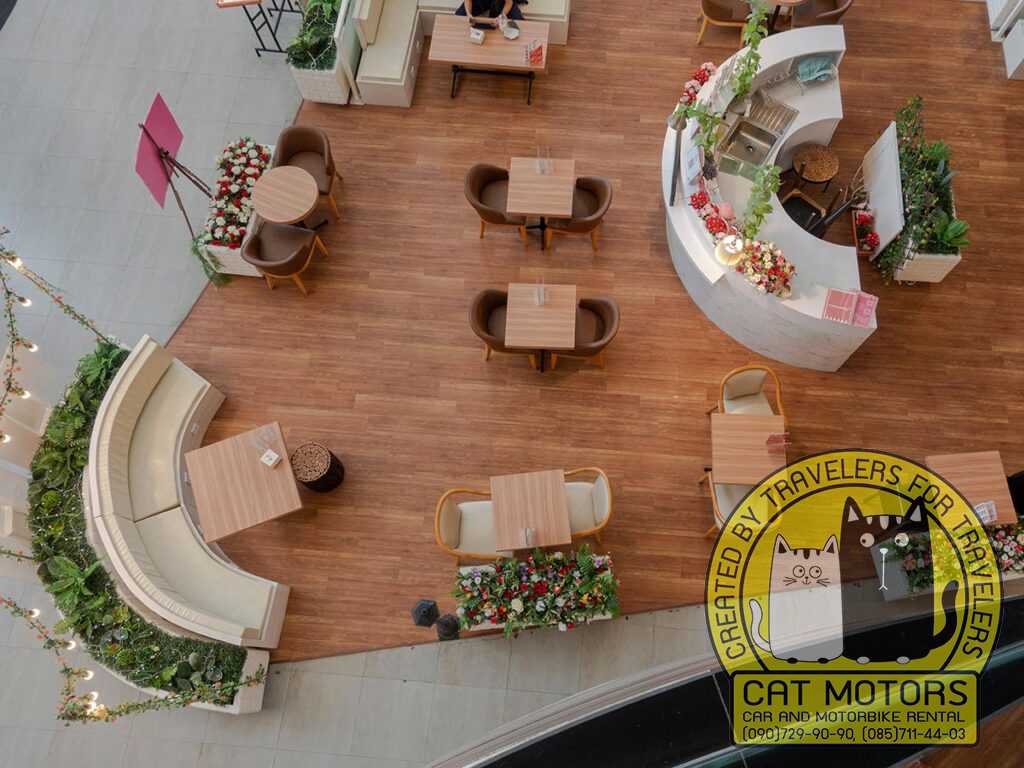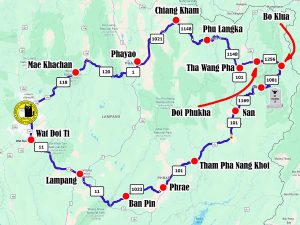The Rise and Fall of Promenada Chiang Mai: Analyzing Its Closure and Future Prospects
Previously, this page served as a guide to this shopping mall. Despite its promising future, the mall closed in 2022. However, with hope for its revival, we would like to share our perspective on what happened. The issue goes beyond just the significant mismatch between the mall’s location and its anchor tenants.
Promenada Chiang Mai in Thailand opened in 2013 as the city’s first “resort mall,” combining shopping and entertainment in a resort-like atmosphere. However, nine years later, in May 2022, the center unexpectedly announced its closure, citing financial difficulties. This event raised questions about the reasons behind Promenada’s failure and the economic, geographic, demographic, and managerial factors that led to its decline in popularity and commercial viability.
This report provides a detailed analysis of the reasons behind the closure (including competition, accessibility, visitor traffic, and conceptual errors) and offers strategic recommendations for potentially reviving the property.

Promenada’s location on the outer ring road always made it difficult to reach without personal transport. Public songthaews don’t run convenient routes to that part of the city, and taxi fares from the old town add up quickly if you visit regularly. This isolation was one of the factors behind the mall’s decline, and it remains a challenge for whatever replaces it on the site.
For visitors exploring the eastern outskirts of Chiang Mai, where Promenada once stood alongside Big C Extra and other retail developments, our motorbike rental in Chiang Mai is the most practical way to get around. The ring road is well-paved and straightforward to navigate, even for those still getting used to riding on the left side.
Reasons for the Closure of Promenada Chiang Mai
Geographic Location and Accessibility
Location outside the city center. Promenada was built on the second ring road of Chiang Mai, about 7–8 km east of the Old Town (approximately a 20–25 minute drive). While the developers claimed “easy access for visitors,” in practice, reaching the mall could be difficult without a private vehicle. Public transportation in Chiang Mai is underdeveloped (there is no city metro or rail), and songthaews (shared taxis) to the mall were irregular. Although Promenada organized its own shuttle from the city, it only partially solved the problem. Consequently, the mall saw fewer “spontaneous” visitors; most people came purposefully for an event or specific service.
Lack of dense surrounding development. The mall was built with the expectation that Chiang Mai’s suburbs would grow (“designed to serve an expanding city and the future second airport”), but that development had not yet materialized around the site. It did not sit at the heart of a large residential or office cluster that could drive daily foot traffic. The mall frequently appeared half-empty during weekdays. Some visitors described Promenada as a “ghost town,” with a significant portion of retail space vacant and very few customers walking around. This impression was amplified by the open, spacious design—when there were few people, the mall felt even emptier.
Demographic Factors and Target Audience
Focus on a limited audience. The developers primarily targeted affluent suburban residents and tourists, positioning Promenada as a high-end shopping and leisure venue away from the city bustle. Major tenants included premium and international brands (e.g., Uniqlo, Rimping supermarket, SF Cinema). However, the actual demographic of Chiang Mai—large numbers of students, mid-range expats, and backpacking tourists—may not have matched those expectations. Most local, middle-class residents preferred familiar hypermarkets (Makro, Big C, Tesco) or malls closer to downtown. As a result, a significant portion of Promenada’s potential customer base was never fully engaged.
Reliance on tourism. Promenada tried attracting tourists with regular events and its unique “resort mall” concept. At one point, it even hosted an immigration office, which brought a steady flow of foreigners needing to extend their visas. Nevertheless, most Chiang Mai tourists gravitate toward the city’s cultural attractions (temples, markets, Old Town) or central entertainment venues rather than a modern shopping center located out of town. After the immigration office relocated, Promenada lost that traffic source. Consequently, its reliance on tourists and expats did not bring in stable visitor numbers, especially during the off-season.
Competition and Economic Conditions
Aggressive competitive environment. When Promenada launched, there were already major retail players in Chiang Mai. In 2013, the giant CentralFestival Chiang Mai—about 70-rai in size, developed by Central Pattana (CPN)—opened. Located on a main highway closer to the city center, CentralFestival immediately drew massive visitor flows and attracted retailers thanks to its broad store selection. The competitor opened just months after Promenada, giving the latter no head start to establish itself. Additionally, Maya Lifestyle Shopping Center and other projects soon emerged. Promenada struggled to keep up: key anchor tenants and popular brands preferred more centrally located malls owned by well-known developers. One early setback for Promenada was losing unique entertainment anchors—plans for an ice rink and some shops ended up moving to CentralFestival, drawing customers away.

Oversupply and declining revenues. Between 2013 and 2015, Chiang Mai saw a surge in new retail supply, while the growth in actual consumer demand was slower. Promenada had to fill around 50,000 m² of leasable space, and in order to attract tenants amid tough competition, management reportedly offered below-cost rental rates to some. This practice resulted in a chronic operational shortfall. When some boutiques closed due to low sales, vacancy rates rose, and the mall lost even more rental income. By 2019–2020, Promenada was in a weakened financial position with substantial vacant units.
Impact of the COVID-19 pandemic. The global crisis of 2020 was devastating for the mall. Tourist arrivals to Chiang Mai plummeted due to border closures, and local residents cut back on shopping because of lockdowns and economic uncertainty. Promenada’s management acknowledged that from 2020 onward, the mall’s revenues did not cover expenses—for three consecutive years, the mall operated at a loss, spending more than it earned every month. Rent discounts, and in some cases rent waivers, were given to tenants to keep them afloat, increasing the financial burden on the owners. By spring 2022, debts had reached a critical level—reports indicated an electricity bill debt exceeding 20 million baht, threatening disconnection of the mall’s power supply. In early May 2022, the mall’s owners announced a “temporary closure” due to an inability to continue operating at a loss without new investments. In reality, it meant the end of Promenada as a commercial property.
Managerial Missteps and Conceptual Errors
Lack of experience and management changes. Promenada was developed by a foreign investor—Dutch firm ECC International—which had not previously managed shopping malls in Thailand. In the first years, the mall achieved some success thanks to novelty and aggressive promotions. Later, management changes resulted in inconsistent development strategies. The new team lacked deep experience in retail development and local market nuances. For instance, some marketing mistakes were noted by visitors—promotions aimed at an international audience, but even the food court initially did not cater to basic linguistic and price expectations for foreigners. Moreover, management may have failed to build long-term relationships with tenants. Rather than adapting its concept, it continued to position Promenada as an upscale center “for the few,” while the market demanded a more mass-market approach. Strategic missteps compounded over time, and when external conditions worsened, there was no financial cushion left.
Questionable “resort mall” concept. The idea of combining a shopping center with landscaped areas and a resort design seemed innovative. Promenada indeed featured attractive architecture, landscaping, an open-air amphitheater, and even a pond on the premises. However, in practice, the novel layout turned into a drawback. Much of the entertainment and food court were located between two main buildings in open-air spaces, which reduced visitor comfort during hot weather or rainy seasons. The open-air format works well for outlet parks or pedestrian streets, but local residents often prefer fully air-conditioned environments for regular shopping. Additionally, the absence of a standard large department store or hypermarket as an anchor gave visitors no strong reason to go there (unlike competitors offering popular department stores or dozens of fashion brands under one roof). Rimping supermarket, while serving as an anchor, targeted a niche market and did not attract mainstream consumers. Hence, the center’s concept was too niche and not resilient enough to maintain steady foot traffic outside of special events.

Lack of adaptation and diversification. Successful malls evolve over time by changing their tenant mix, adding new functions (services, coworking spaces), and reimagining underused areas. Promenada did not undertake such flexible adaptation soon enough. Many vacated retail spaces remained empty or were filled with only temporary exhibits. Management did not reconsider the format—for instance, they did not convert parts of the complex into offices or educational facilities to boost daytime footfall. Essentially, the mall “got stuck” in its original model, which was no longer viable, thus exacerbating the impact of other challenges.
Key Reasons for Decline and Closure
Based on the above analysis, the following were the main reasons for Promenada Chiang Mai’s commercial failure:
- Unfavorable location and accessibility: It was remote from the city center with insufficient casual visitors lacking personal vehicles.
- Limited target audience: Overemphasis on affluent shoppers and tourists, with insufficient draw for the broader local market.
- Intense competition: Larger malls (CentralFestival, etc.) in better locations attracted visitors and tenants, overshadowing Promenada.
- Financial issues: High costs and low occupancy, rental rate undercutting, mounting debt, and the COVID-19 pandemic’s severe impact on revenue.
- Management and conceptual errors: Inexperienced leadership, lack of strategic adjustments, and a questionable “resort mall” format that did not match consumer habits.
Combined, these factors left Promenada commercially unviable by 2022, forcing its closure. Nonetheless, the mall still has inherent strengths—beautiful, expansive grounds, distinctive architecture, and a potentially strategic location as the city expands. This provides a basis to consider possible reorganization and “relaunch” strategies in a new format.
Strategic Recommendations for Reviving the Property
Reviving a closed mall requires a major reconceptualization that addresses past mistakes and adapts the property to current market demands. Below are possible approaches, ranging from updating the retail format to introducing entertainment, educational functions, and hybrid models. A combination of these approaches may be optimal.
Transforming the Retail Model
Changing retail format. Promenada could pivot from an upscale positioning toward a more accessible and mainstream format. One option is converting it into an outlet village or discount center where well-known brands sell at reduced prices, attracting both local bargain-hunters and shopaholic tourists. Another approach is emphasizing local flair, such as creating an indoor market for high-quality local products and artisanal crafts—something that might appeal to both residents and tourists seeking authentic items.
Attracting new anchor tenants. Reviving foot traffic requires strong “anchors” that draw visitors. One strategy is securing a major supermarket or hypermarket in the mid-priced segment (e.g., Tesco Lotus, Big C) for essential shopping. Alternatively, consider an underserved product category, such as a large electronics/tech store or a home-improvement (DIY) center, to attract a different segment of homeowners. Another approach is focusing on family-oriented segments: a large children’s store or development center where families come to shop and spend time with their kids.
Local brands and flexible leases. In addition to major chains, the mall should consider bringing in local entrepreneurs—small boutiques, showrooms, and creative workshops. Management may have to offer flexible terms (reduced rents, co-marketing) to encourage local businesses. Such “incubation” can energize the mall’s atmosphere and fill vacant units. For example, Promenada’s spaces could be used for pop-up stores or weekend markets for local designers and artisans. Regularly rotating events can encourage repeat visits. The food hall could also be reimagined as a food market featuring popular local street-food vendors, creating a culinary cluster that increases visitor dwell time and spending.
Entertainment Concept
Upgrading and expanding entertainment. Promenada already has some infrastructure (bowling lanes, cinema, kids’ play areas) that could be expanded into a comprehensive family entertainment center. Indoor attractions are especially popular in Thailand’s hot climate, such as trampolines, climbing walls, roller skating, or laser tag arenas. For teens and young adults, add a VR/AR center and a cyber-sports arena for gaming tournaments—unique features that can attract visitors specifically to Promenada.
Cinemas and event stages. The existing cinema could be upgraded, for instance, by adding IMAX or 4DX screens and hosting premiere showings and film festivals to compete with downtown theaters. The open-air amphitheater and event spaces are valuable assets—actively use them by turning the center into a festival and concert venue. For example, organize weekly concerts by local bands, outdoor movie screenings, themed fairs (food festivals, flower shows, etc.). If these events become regular, residents may develop the habit of visiting Promenada every weekend for cultural recreation. Cooperation with local authorities and communities to include Promenada in official event programs can further elevate its profile.
Parks and active recreation. Another unique feature could be an outdoor recreation zone—transform part of the premises into an adventure park with a ropes course, skate park, fitness and yoga areas. Instagram-worthy spaces are highly popular in Thailand—promenade gardens with art installations could draw younger visitors looking for photo opportunities. Combining shopping with nature walks and children’s play areas in a landscaped setting would strengthen Promenada’s positioning as a leisure destination. If a second airport is indeed built nearby, part of the land could be reserved for a tourist-friendly amusement park in the future. Hence, Promenada could become the main entertainment hub in eastern Chiang Mai, complementing its retail function.
Educational and Business Uses
Educational campus or lifelong-learning center. Another non-traditional strategy is attracting educational institutions. Promenada’s spaces are suitable for university or college branches, language schools, or enrichment programs. For example, the mall could partner with an international university to establish a Chiang Mai campus on its premises—students would then use the onsite facilities (cafes, shops) throughout the day. Alternatively, part of the space could be allocated for after-school programs in robotics, art, or music for children; parents dropping kids off for lessons would likely shop or dine in the mall.
Coworking and office spaces. As remote work and digital nomadism grow in Chiang Mai, Promenada could become a large coworking center. Unoccupied galleries could be converted into modern workspaces and small offices. The benefits include a quiet location, ample parking, and onsite food options. If a few IT companies or startups lease offices, it creates daytime foot traffic of young professionals. Globally, malls are increasingly integrating coworking spaces to let people “work, shop, and socialize in one place.”
Cultural-educational facilities. Adding museums, libraries, or a science center could be another way to attract new audiences. For example, an interactive Discovery Center or technology museum could draw families and students. A public library or media center occupying part of the second floor could appeal to the intellectual community. Collaboration with government agencies—relocating state offices (such as an immigration branch or a public services center)—could also guarantee a steady daily stream of visitors, who might then shop or dine afterward. Overall, the more useful services and knowledge Promenada can offer, the more it becomes embedded in residents’ routines.
A Hybrid Mixed-Use Model
A mixed-use model that combines the approaches above may be the best option for a large-scale property like Promenada. Contemporary developers are moving away from single-purpose malls in favor of multi-use “lifestyle centers” where shopping, leisure, work, and even housing converge. Promenada already has some of the attributes for evolving into such a lifestyle hub:
- Residential component: Consider partially redeveloping it for apartments or a hotel. The upper floors or one building wing could be converted into lodging (useful if a nearby airport is built) or a condominium. Residents and hotel guests would provide a baseline of daily facility usage.
- Offices and government facilities: Another wing could host a business center with small offices, coworking spaces, and administrative offices. Bringing in government tenants (immigration, tax office, bank branches) would ensure weekday visitor flow.
- Entertainment and fitness: Dedicate a different section to a recreation cluster (cinema, VR zone, children’s park, a gym, or a sports club with a pool).
- Retail and services: Reserve the ground floor and outdoor areas as a public space with shops, a market area, restaurants, and a park. The goal is for visitors to spend the entire day onsite: working or studying in the morning, shopping at lunchtime, and relaxing in the evening.
Global experience shows that these multi-functional centers are more resilient. If one revenue stream (e.g., retail) dips during a crisis, another (e.g., office or residential leasing) can sustain the project. The key is to plan the architectural layout so that various user flows—residents, office workers, shoppers—complement rather than hinder one another. Promenada’s existing layout, with open spaces and event venues, is already partway to a lifestyle center; it only needs further development with missing components.
Conclusions and Next Steps
Promenada Chiang Mai serves as a high-profile example of a project that faced market realities head-on. The analysis shows that its closure resulted from multiple factors, from its problematic location and conceptual misalignment to external shocks like the pandemic. Yet the property is not devoid of potential—indeed, with the right strategy, it could reopen with a new identity.
A thorough feasibility study is recommended, including updated market research to gauge current demand among Chiang Mai’s residents, businesses, and investors. Building on the ideas outlined—retail transformation, entertainment enhancements, educational and mixed-use functions—a master plan can be developed to breathe new life into Promenada. It is crucial to incorporate modern trends, as today’s consumers value experience and convenience. A revived Promenada should become a community hub, offering both local residents and tourists a place to live, work, and enjoy leisure time. Only such a comprehensive approach can overcome the previous shortcomings and ensure a sustainable future for the property. With sufficient investment and support from local authorities, Promenada could evolve from a failed “shopping resort” into a successful multi-purpose hub adapted to 21st-century needs.
- Author: Konstantin Zh
- Updated: February 3, 2026
- No Comments




